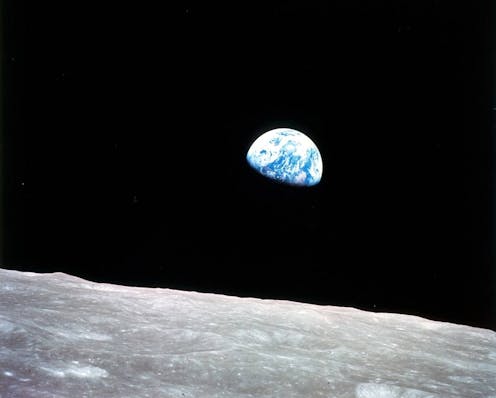Is it possible to heal the damage we have already done to the Earth?
- Written by Scott Denning, Professor of Atmospheric Science, Colorado State University

There still are problems to solve. Some pollutants, like plastic, last for thousands of years[17], so it’s much better to stop releasing them than to try to collect them later. And extinction[18] is permanent, so the only effective way to reduce it is to be more careful about protecting animals, plants and other species.
The most serious damage humans are doing to the Earth comes mainly from burning coal, oil and gas, which is dramatically warming its climate[19]. Burning these carbon-based fuels is changing the fundamental chemistry and physics of the air and oceans.
Every lump of coal or gallon of gasoline that’s burned releases carbon dioxide into the atmosphere. There it heats the Earth’s surface[20], causing floods, fires and droughts. Some of this added carbon dioxide dissolves into the oceans and makes them more acidic[21], which threatens ocean food webs.
Climate change is a problem that will get worse until humans stop making it worse – and then it will take many centuries for the climate to return to what it was like before the Industrial Revolution[22], when human actions started altering it on a large scale.
The only way to avoid making things worse is to stop setting carbon on fire. That means societies need to work hard to build an energy system that can help everyone live well without the need to burn carbon.
The good news is that we know how to make energy without releasing carbon dioxide and other pollution. Electricity made from solar, wind and geothermal power is now the cheapest energy in history[23]. Cleaning up the global electricity supply and then electrifying everything[24] can very quickly stop carbon pollution from getting worse.
This will require electric cars and trains, electric heating and cooking, and electric factories. We’ll also need new kinds of transmission and storage systems to get all that clean electricity from where it’s made to where it’s used.
The rest of the carbon mess can be cleaned up through better farm and forest management[25] that stores carbon in land and plants instead of releasing it into the atmosphere. This is also a problem that scientists know how to solve.
The Earth will certainly heal, but it may take a very long time. The best way to start is with everyone doing their part to avoid making the damage any worse.
Hello, curious kids! Do you have a question you’d like an expert to answer? Ask an adult to send your question to CuriousKidsUS@theconversation.com[26]. Please tell us your name, age and the city where you live.
And since curiosity has no age limit – adults, let us know what you’re wondering, too. We won’t be able to answer every question, but we will do our best.
References
- ^ Curious Kids (theconversation.com)
- ^ curiouskidsus@theconversation.com (theconversation.com)
- ^ about 4.5 billion years old (www.nationalgeographic.org)
- ^ fires burned over large areas (www.earthmagazine.org)
- ^ covered with ice (www.climate.gov)
- ^ mass extinctions (www.amnh.org)
- ^ damaged the systems that sustain us (www.scientificamerican.com)
- ^ air (www.who.int)
- ^ water (www.unep.org)
- ^ plastic (www.oecd.org)
- ^ other trash (www.unep.org)
- ^ destroyed habitats (www.nytimes.com)
- ^ help natural processes (theconversation.com)
- ^ a lot of progress (gispub.epa.gov)
- ^ started waking up to these problems 50 years ago (www.earthday.org)
- ^ USEPA (www.epa.gov)
- ^ last for thousands of years (www.nationalgeographic.com)
- ^ extinction (ourworldindata.org)
- ^ dramatically warming its climate (theconversation.com)
- ^ heats the Earth’s surface (climatekids.nasa.gov)
- ^ makes them more acidic (www.noaa.gov)
- ^ before the Industrial Revolution (theconversation.com)
- ^ the cheapest energy in history (www.weforum.org)
- ^ electrifying everything (www.vox.com)
- ^ better farm and forest management (www.nationalgeographic.com)
- ^ CuriousKidsUS@theconversation.com (theconversation.com)
Authors: Scott Denning, Professor of Atmospheric Science, Colorado State University


